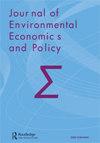Towards full decarbonization: does environmental tax and renewable energy matters in developing countries?
IF 1.2
Q3 ENVIRONMENTAL STUDIES
Journal of Environmental Economics and Policy
Pub Date : 2023-11-10
DOI:10.1080/21606544.2023.2279963
引用次数: 0
Abstract
ABSTRACTDespite the role of energy in growth and development, the consumption of fossil fuel rises the global temperature, which poses a significant threat to the full decarbonization agenda of the global community. This study examines the impact of environmental tax and renewable energy on the full decarbonization of 25 developing countries with data from 1993 to 2019. The study used DCCE and CS-ARDL estimators, and the results revealed that environmental tax and renewable energy promote full decarbonization. Moreover, the evidence indicates the validity of the environmental Kuznets curve (EKC) in developing countries, with a turning point at 2.56 in the DCCE to 1.44 in the CS-ARDL. Also, the findings confirmed financial development's role in enhancing renewable energy's impact on full decarbonization in developing countries. Therefore, of this study confirmed the ‘double dividend’ hypothesis that environmental tax policy can mitigate CO2 emissions, correct ecological externalities, and generate revenue. Policymakers in developing countries should strive to undertake tax reform to achieve efficient tax system. In addition, they should formulate and enforce effective environmental tax policies to accelerate full decarbonization and achieve SDGs. Also, massive investment should be channeled to renewable energy projects to provide affordable and cleaner energy, to minimize the consumption of fossil fuel.KEYWORDS: Environmental tax; renewable energy; decarbonizationenvironmental Kuznets curveJEL: H20Q20Q50Q56 Disclosure statementNo potential conflict of interest was reported by the author(s).Data availabilityThe data for this research are obtained from World Development Indicators, the world bank database, and OECD database, which are publicly available. Also, can be obtained from the corresponding author.迈向完全脱碳:环境税和可再生能源对发展中国家重要吗?
【摘要】尽管能源在经济增长和发展中发挥了重要作用,但化石燃料的消耗使全球气温上升,这对全球社会的全面脱碳议程构成了重大威胁。本研究利用1993年至2019年的数据,考察了环境税和可再生能源对25个发展中国家全面脱碳的影响。采用DCCE和CS-ARDL估算,结果表明环境税和可再生能源促进了完全脱碳。此外,证据表明环境库兹涅茨曲线(EKC)在发展中国家的有效性,DCCE的转折点为2.56,CS-ARDL的转折点为1.44。此外,研究结果证实了金融发展在增强可再生能源对发展中国家全面脱碳的影响方面的作用。因此,本研究证实了“双重红利”假设,即环境税收政策可以减少二氧化碳排放,纠正生态外部性,并产生收入。发展中国家的政策制定者应该努力进行税收改革,以实现有效的税收制度。此外,各国应制定和执行有效的环境税收政策,以加速全面脱碳和实现可持续发展目标。此外,应将大量投资引向可再生能源项目,以提供负担得起的清洁能源,最大限度地减少化石燃料的消耗。关键词:环境税;可再生能源;披露声明作者未报告潜在的利益冲突。数据可得性本研究的数据来自世界发展指标、世界银行数据库和经合组织数据库,这些数据库均可公开获取。也可以从通讯作者处获得。
本文章由计算机程序翻译,如有差异,请以英文原文为准。
求助全文
约1分钟内获得全文
求助全文
来源期刊

Journal of Environmental Economics and Policy
ENVIRONMENTAL STUDIES-
CiteScore
4.70
自引率
7.70%
发文量
26
 求助内容:
求助内容: 应助结果提醒方式:
应助结果提醒方式:


